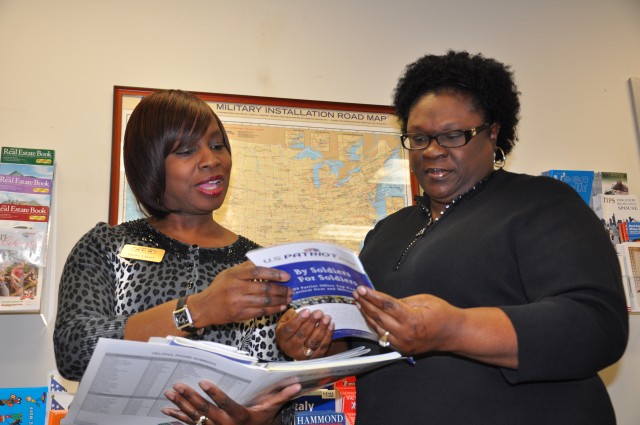
FORT JACKSON, S.C. -- When Miranda Broadus was hired to work at Fort Jackson in 2008, she had already spent months doing research about the installation and surrounding area.
With 25 years of experience working at different U.S. Naval bases all around the world, Broadus already knew where to get information online to help make her transition to Fort Jackson a smooth one.
But what she didn't know was in which area near post was best for her to live.
"You go on the Internet and you see these places that look really nice, but you don't really know about that part of town," Broadus said.
So she called Fort Jackson's Army Community Services Employment Readiness Assistant, Shirley Cherry, who would not only be Broadus' future coworker, but would also serve as her sponsor.
"She was so helpful," Broadus said. "I called her and said 'I've been looking in this area, have you heard of this apartment complex or address'' and when I gave her the name and address she said 'No, no, no, you don't want to live in that part of town.'
Cherry sent Broadus information about reputable apartment complexes, the specials they were running, about the school districts, the number to the off-post housing and school liaison offices, and other things above and beyond what Broadus had requested.
"She even went as far as to send me a welcome package, and a list of all the schools and their ratings," Broadus said. "I was like 'Wow, this is first-class service.'"
When Broadus finally arrived here, Cherry made sure her new colleague was comfortably settled in. Broadus said Cherry's hospitality made her feel like she fit right in.
Broadus said not only had Cherry set a precedent for how future ACS sponsors would treat new employees, but she had also set a standard for Army sponsorship that Broadus, in her position as the ACS Relocation program manager, now teaches other sponsors to emulate as they prepare to welcome their own Soldiers and civilian employees to Fort Jackson.
In the ACS Sponsorship Training class, which Broadus said is designed to educate command appointed sponsors and those interested in becoming a sponsor on their roles and responsibilities, she said she provides them with all the resources and tools they need for effective sponsorships.
Broadus will teach the next class Feb. 17, and she said she expects her classroom to fill up fast because the Total Army Sponsorship Program has just become true to its name. Sponsorship is now mandated for the total Army - all Soldiers and DA civilians transitioning to new installations will get sponsors.
In January, Gen. Peter Chiarelli, vice chief of staff of the Army, released a directive that all installations implement an active sponsorship program mandating Soldiers in the rank of private through colonel and civilians in grades GS-15 and below to be assigned a sponsor, and that a trained sponsorship pool must exist at the unit and installation level.
"It's a program that's always been in place, we've always had it, but it was pretty much, 'If you want a sponsor you can request it, and we'll get one provided to you,'" Broadus said.
The directive came as a result of a recent Army Family Action Plan issue that the sponsorship program had not been effectively implemented, utilized, monitored and inspected. An AFAP committee recommended that the program be standardized and enforced Armywide, with an emphasis on taking care of Soldiers relocating to and from Initial Entry Training.
"The AFAP identified the sponsorship program as not being implemented at each location, whereas it was assumed that sponsorship was alive and well," said Twyla Perkins, supervisor for Human Resources Strength Management.
With the new mandate, the TASP should do what it was designed to do - to help Soldiers, their family members and civilian employees transition easily from one installation to another, and to have assistance provided to them by their gaining command, Perkins said.
Perkins, who is in charge of coordinating levy briefings, said all relocating Soldiers will be required to fill out a DA form 5434 requesting a sponsor for their next unit. More often than not, the Soldier will be assigned a sponsor before arriving at the next installation. If for some reason the gaining unit does not receive the Soldier's information before the PCS, the unit will assign a sponsor through what's called reactionary sponsorship, upon arrival.
The Army is expected to launch an automation system that tracks sponsorship as a part of in and out processing in an attempt to alleviate such delays.
Civilian employees must contact their gaining Civilian Personnel Office or future supervisor to be assigned a sponsor.
The directive does not mandate that the sponsor and person being sponsored be the same rank or grade, but Broadus said it is highly recommended.
"The units usually try to match Soldiers with sponsors who are of the same rank if they can, the same gender or whose family make up is the same," Broadus said. "If the Soldier is married with children, it's good to have a sponsor that also has kids."
The Army also requires that Soldiers and civilian employees possess certain qualities in order to be selected as sponsors.
"They must be motivated," Broadus said. "They have to want to volunteer because someone who really wants to do something is going to give it their all. They must be open-minded and be able to put themselves in the newcomers shoes. They need to be culturally diverse, but the most important thing is they need to be positive."

Social Sharing